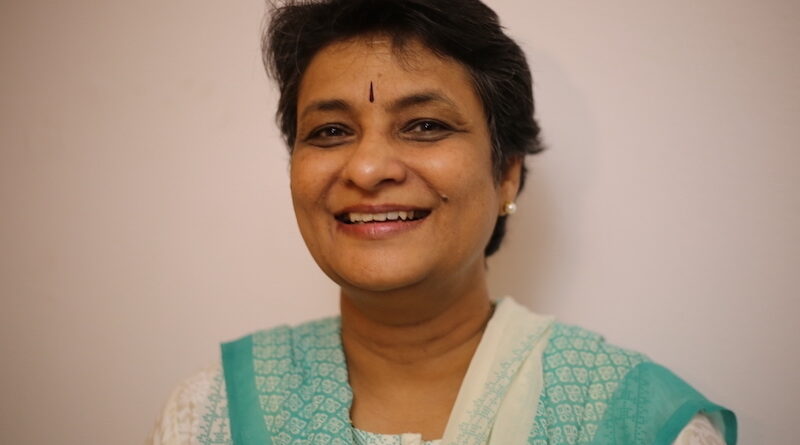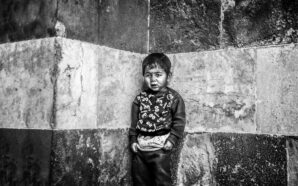This article is part of Ananke's Special Resilience Edition published in July 2021 on ISSUU, click here to read the entire magazine.
“There are more good people than bad people, and overall there’s more that’s good in the world than there is that’s bad. We just need to hear about it, we just need to see it.”
― Tucker Elliot, The Day Before 9/11
During the pandemic, the gross negligence of the Indian government led to ordinary citizens looking out for and helping each other.
One such shining example of a good Samaritan is Dr. Mukti Bosco, who has traversed places and touched the lives of people who have been shunned and forsaken by society.
I remember our introductory meeting at the Healing Fields Foundation corporate office in Banjara Hills, Hyderabad. Bosco wore an unassuming demeanour, but her eyes lit with unmistakable purpose.
An Ashoka Fellow, Mukti Bosco strives to find innovative solutions to the health challenges of India’s most marginalized communities. She has been a presenter at the Clinton Global Initiative, the World Economic Forum, and the Mayo Clinic’s Transform Conference. Mukti was a finalist for the Social Entrepreneur of the Year Award, 2019, by the Schwab Foundation and Jubilant Bharatiya for the various impactful programs she drives at Healing Fields Foundation.
How Bosco’s Healing Fields Foundation Became The Voice of the Voiceless
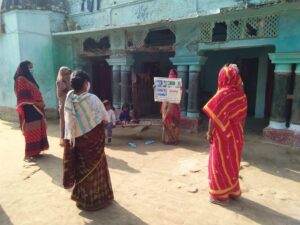 The seeds of Bosco’s social philanthropy were sown in her early childhood days when she would accompany her parents to eye camps organised in remote parts of India. Her interest in community health started to take roots in childhood, and it became her natural course in adulthood when she went to Christian Medical College Vellore for her graduation.
The seeds of Bosco’s social philanthropy were sown in her early childhood days when she would accompany her parents to eye camps organised in remote parts of India. Her interest in community health started to take roots in childhood, and it became her natural course in adulthood when she went to Christian Medical College Vellore for her graduation.
Later, a chance meeting with Tahir, an impoverished 7-year-old boy, and his family while conducting a Health Needs Assessment survey in Charminar, Hyderabad, triggered Mukti.
When Tahir’s father, the breadwinner in the family, fell ill, Tahir was coerced to take his father’s place and earn money. Bosco’s son was around five years at the time, and so she couldn’t fathom how a boy as young as Tahir had to work for 15 to 18 hours with one square meal a day. Or the fact that Tahir’s earnings were seized.
Tahir’s situation sparked Bosco to start her social enterprise, Healing Fields Foundation, in 2000 and protect the vulnerable poor population from health shocks.
The HFF Model Solution: Poverty + Poor Health Problem
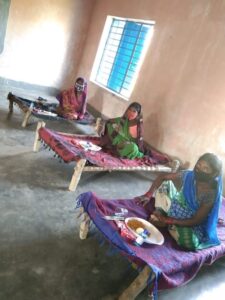 Healing Fields Foundation is a health-focused NGO. Under Bosco’s leadership, HFF builds vibrant eco-systems of rural health care in areas where basic health services are absent or severely deficient.
Healing Fields Foundation is a health-focused NGO. Under Bosco’s leadership, HFF builds vibrant eco-systems of rural health care in areas where basic health services are absent or severely deficient.
Bosco’s approach to power up from the bottom-top of our social hierarchy is close on the heels of the adage, “the hand that rocks the cradle rules the world.” Bosco believes health is in the woman’s hands, as she is the primary family custodian.
HFF empowers voiceless women to become community health leaders, ground-up health entrepreneurs, and health agents of change in their villages.
They partner with the government, the private healthcare sector, microfinance institutions, and civil society organizations to multiply the impact.
Bosco’s astute understanding of the rural communities and their challenges led to the development of her innovative micro-health insurance model, which won her prestigious Ashoka Fellow recognition.
She learned that for her vision to be sustainable, women must earn an income in their role as health change agents in their communities.
Soon, Bosco came up with another empowering program – the Community Health Entrepreneur (CHE) program, which sustains the livelihoods of women from rural and resource-poor communities.
Today, Bosco leads the HFF’s preventive health education program that reaches over 6 million families across India. HFF is the only Indian NGO to produce and distribute sanitary napkins through community health entrepreneurs (CHEs).
In 2017, Bosco digitised the entire cycle of the HFF training process for sustainable education and accountability – creating the plan, assigning the resources, and capturing the sessions and metrics in real-time.
She believes that her technology platform will bring a revolution in education, training, and rural livelihoods. Bosco says,
“No industry has a single technology platform that can do this, more so in the rural areas where Healing Fields operates.”
Women At The Forefront Of COVID-19 Relief Efforts
The disturbing news and visuals of the migrant workers returning to their hometowns affected Mukti Bosco, who decided to go to the site with Sujata Rao, her friend, and help them.
In the hot summer month of May, the duo reached Medchal to witness the grave sight of hapless children, women, and men trudging with their luggage on bare, blistered feet and queuing up near tipper trucks in the desperate hope of returning to their hometowns.
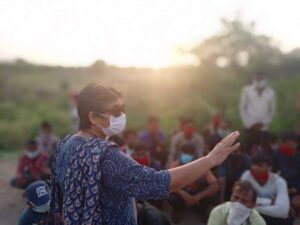 Bosco put together her task force, comprising Bosco Malapati, Shreya Reddy, Sujata Rao, and herself, among other HFF team members. They provided footwear, first aid, masks, food, and water supplies and arranged six buses in the first few days to send people safely to Madhya Pradesh, Chhattisgarh, Bihar, and Jharkhand. It was possible with funds from HFF and crowdfunding.
Bosco put together her task force, comprising Bosco Malapati, Shreya Reddy, Sujata Rao, and herself, among other HFF team members. They provided footwear, first aid, masks, food, and water supplies and arranged six buses in the first few days to send people safely to Madhya Pradesh, Chhattisgarh, Bihar, and Jharkhand. It was possible with funds from HFF and crowdfunding.
The HFF team created special quarantine zones for the migrant workers at their destination with their network of community health workers in Bihar, Chhattisgarh, and Jharkhand. In places where they didn’t have a presence, they collaborated with community health leaders to make the necessary arrangements to quarantine the workers and their families.
The team set up camp at Kamareddy to ensure that the migrant workers reached their destination safely. They sent 2500 workers in 47 buses in the first two weeks. Their moment of relief and satisfaction came when the workers shared pictures from their hometowns with their loved ones with the team.
Then, there’s the story of Saleha, an HFF CHE in Bihar who’s been with the organisation since 2009. Ever since she has educated hundreds of girls and women to break superstition and patriarchal belief systems on menstrual health and encourage positive maternal health practices. Due to her impact, the government recruited her as an Accredited Social Health Activist worker.
Since the COVID-19 pandemic, Saleha has been enlightening her community members about the safety practices to curtail the spread of the deadly virus. She ensures the regular supply of sanitary napkins in these dire times and focuses on maternal health, especially for women in their last trimester of pregnancy.
Chandani, a pregnant woman from her village who went into labor, didn’t receive free service for low-income families and had to pay a hefty sum of Rs. 12,000 at a private hospital. Saleha intervened and reported the case to the District Magistrate, who took immediate action.
Women like Saleha have been at the forefront of COVID-19 relief efforts and continue to work hard to ensure accessible and affordable healthcare to people who need it the most.
As per HFF’s COVID-19 rapid response update on Feb 2021 –
- 2,475 migrants in 45 buses were provided safe transport with dignity.
- 4078 migrant labour were provided shelter in 103 quarantine centres.
- 8555 families provided access to entitlement.
- 27,725 calls received by Gramvaani.
- 56,166 people from 10,212 families received 3 kits of ration.
- 1200 CHFs have been trained on COVID-19 prevention and management and driving the COVID response in 1200 villages in 4 states.
- Each CHF reaches out to and educates around 1500 people in her village, and 625,000 people are being reached with health education and awareness.
- Setting up village-level Community COVID care centers to ensure families with no facilities can comply with isolation.
- Around 50 COVID care centers set up, providing isolation facilities to 400 people to date, and 485 COVID health and resilience committees were formed at the village level.
- Connecting COVID-19 patients to a doctor through a telehealth advisory platform and ensuring regular follow-up of the patients by the remote doctors.
- Stocked with equipment like oximeters and infrared thermometers.
- Tele counselling and mental health support to the community through trained telecounsellors and supported by mental health helpline.
- Support to families in isolation with medicine, nutrition, and sanitation kits.
- Protective gear and health insurance for the CHEs.
- Educating the people in isolation centers on isolation protocols.
- 60 CHEs trained on providing mental health counselling.
Finding Light In A Dark Place
If the pandemic has brought upon anxiety, loss, and death, then people like Mukti Bosco and their stories remind us that there’s power and strength within each of us.
All it takes is one candle to light up the world.
You.
Tina Sequeira is a marketer and moonlighting writer. Winner of the Rashtriya Gaurav Award (2019) in association with the Government of Telangana, the Orange Flower Award (2017) by Women’s Web, GrandQueens Leadership Award (2020) by Lions Clubs International, Women Lit of the Year Award (2020) by I.N.S.P.I.R.E Beyond Motherhood Awards and more, Tina has published several short stories, poems, and essays in international literary journals and anthologies. Tina has been listed among the ‘Top 35 writers of 2017’ and ‘Top 20 Writers of 2020’ by Youth Ki Awaaz, India’s leading digital platform for Social Justice. Find her at www.thetinaedit.com and on most social media platforms @thetinaedit.




